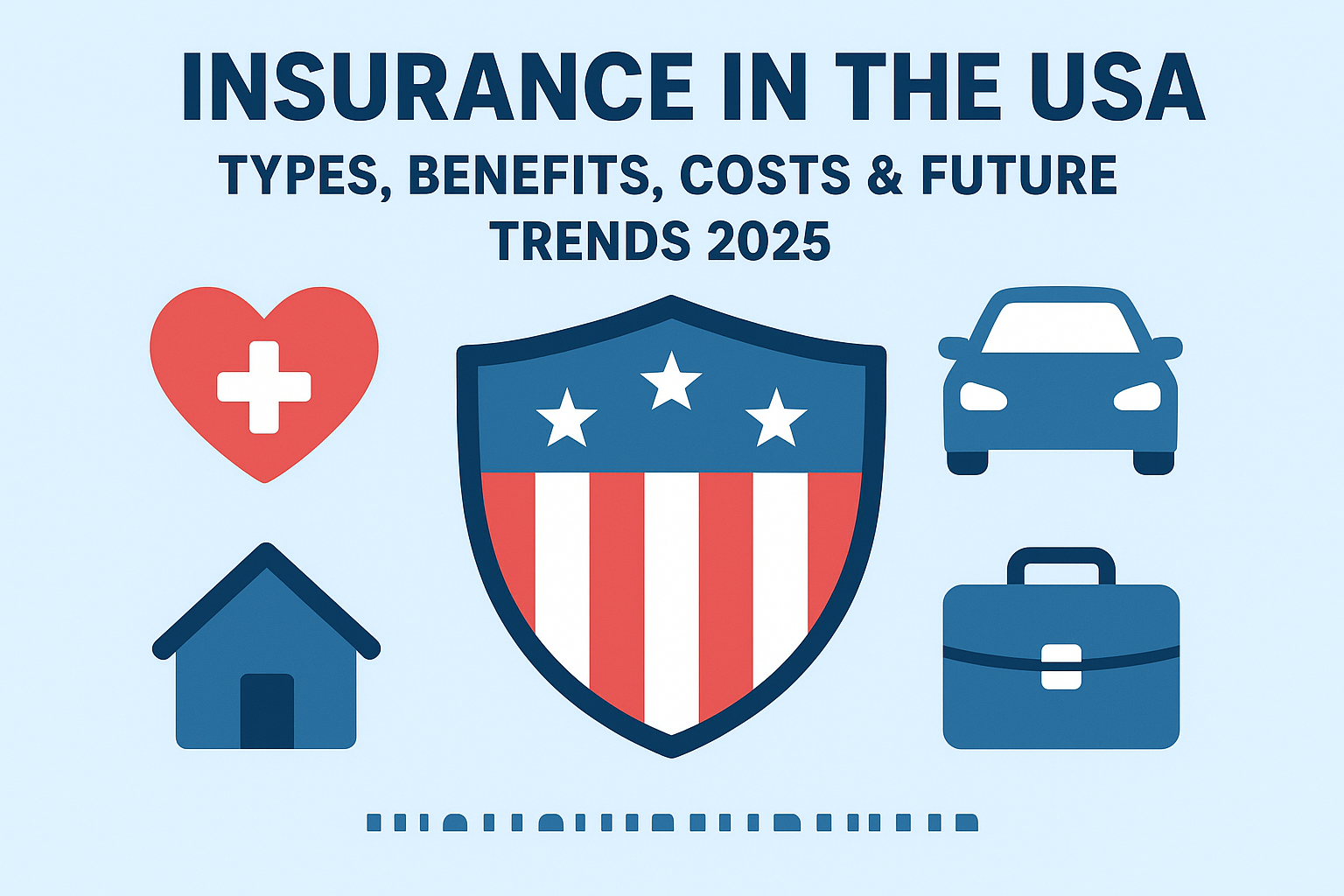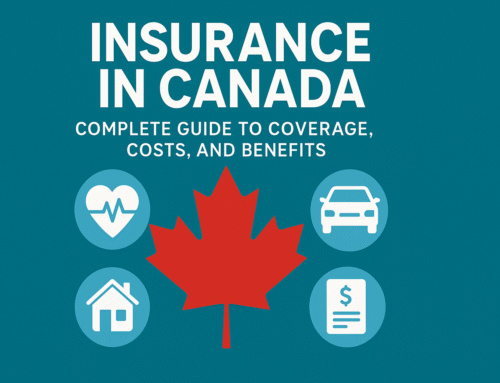Insurance in the USA: A Complete Guide for 2025

Insurance plays a crucial role in the financial security of individuals and businesses in the United States. From health and life insurance to auto, home, and business coverage, Americans rely on insurance policies to protect against unexpected losses. In today’s complex economic landscape, understanding the different types of insurance and how they work is essential for making informed financial decisions.
This article provides a detailed look at insurance in the USA, including its importance, types, benefits, challenges, and future trends.
Why Insurance Matters in the USA
The USA has one of the largest and most diverse insurance markets in the world. With high healthcare costs, rising property values, and the growing need for financial protection, insurance has become more than just an option—it is a necessity.
Here are some key reasons why insurance is important in the United States:
- Financial Protection: Insurance provides coverage for unexpected events such as accidents, illnesses, or natural disasters, reducing the financial burden.
- Legal Requirements: Certain insurance types, such as auto liability insurance, are mandatory in most states.
- Peace of Mind: Knowing that you are protected from major financial risks allows individuals and families to live with confidence.
- Risk Management for Businesses: Insurance shields businesses from liability, employee injuries, property damage, and other risks.
Major Types of Insurance in the USA
The insurance industry in the USA is diverse, offering many types of policies tailored to different needs. Below are the most common categories:
1. Health Insurance
Health insurance is one of the most critical forms of coverage in America due to the country’s high medical expenses. Most citizens access health insurance through employers, government programs (like Medicare and Medicaid), or private insurers.
- Employer-Sponsored Plans: Often include medical, dental, and vision coverage.
- Government Programs: Medicare supports seniors and people with disabilities, while Medicaid helps low-income individuals.
- Marketplace Plans: Available under the Affordable Care Act (ACA) for individuals and families.
2. Life Insurance
Life insurance provides financial support to beneficiaries after the policyholder’s death. It is especially important for families that depend on one person’s income.
- Term Life Insurance: Covers a specific period, usually 10, 20, or 30 years.
- Whole Life Insurance: Offers lifelong coverage and builds cash value over time.
- Universal Life Insurance: Provides flexibility in premium payments and death benefits.
3. Auto Insurance
Auto insurance is legally required in almost every state. It protects drivers, passengers, and vehicles in case of accidents.
Key coverages include:
- Liability Coverage: Required by law; covers injuries or damages you cause to others.
- Collision Coverage: Pays for damages to your car from accidents.
- Comprehensive Coverage: Covers theft, natural disasters, or vandalism.
- Uninsured Motorist Coverage: Protects you if the other driver has no insurance.
4. Homeowners and Renters Insurance
- Homeowners Insurance: Provides coverage for property damage, theft, and liability claims. Lenders usually require it when buying a home with a mortgage.
- Renters Insurance: Protects tenants’ belongings and offers liability coverage.
5. Business Insurance
Companies in the USA rely heavily on business insurance to safeguard against lawsuits, accidents, and other risks. Common policies include:
- General Liability Insurance
- Workers’ Compensation Insurance
- Commercial Property Insurance
- Professional Liability Insurance
6. Travel Insurance
Travel insurance is popular among Americans who frequently travel abroad. It covers trip cancellations, lost luggage, medical emergencies, and more.
Factors Affecting Insurance Costs in the USA
Insurance premiums in the USA depend on several factors, including:
- Age and Health: Younger and healthier individuals often pay lower premiums.
- Location: Living in areas prone to natural disasters or high crime may increase costs.
- Coverage Type and Amount: Higher coverage limits mean higher premiums.
- Driving Record: Auto insurance costs depend heavily on past driving behavior.
- Credit Score: Many insurers consider credit history when determining premiums.
Benefits of Having Insurance
Having the right insurance plan offers multiple benefits:
- Financial Security: Protects against unexpected medical bills, car repairs, or property damage.
- Access to Better Healthcare: Health insurance ensures access to hospitals and medical treatments.
- Legal Compliance: Auto and business insurance are mandatory in most states.
- Wealth Protection: Prevents savings from being drained due to unexpected events.
- Business Stability: Ensures that companies can operate smoothly even during crises.
Challenges in the US Insurance Market
While insurance is essential, Americans face several challenges when it comes to choosing and maintaining coverage:
- High Premiums: Health and auto insurance can be very costly.
- Complex Policies: Many people find it difficult to understand insurance terms and conditions.
- Coverage Gaps: Not all policies cover every possible situation, leading to unexpected out-of-pocket expenses.
- Rising Healthcare Costs: Even insured individuals often face high deductibles and co-pays.
Future of Insurance in the USA
The insurance industry is constantly evolving. Some of the key trends shaping the future include:
- Digital Transformation: Online platforms and mobile apps are making it easier to compare and purchase insurance.
- Artificial Intelligence (AI): Used for faster claims processing and risk assessment.
- Customized Policies: More insurers are offering flexible, personalized plans.
- Usage-Based Insurance: Especially in auto insurance, premiums may depend on actual driving behavior.
- Focus on Wellness Programs: Health insurers increasingly encourage preventive care and healthy lifestyles.
Tips for Choosing the Right Insurance in the USA
- Assess Your Needs: Consider your health, assets, dependents, and financial situation.
- Compare Providers: Shop around to find the best coverage at competitive rates.
- Understand Policy Terms: Read the fine print to avoid hidden costs.
- Seek Professional Advice: Insurance agents or brokers can help you navigate complex policies.
- Review Annually: Reassess your coverage every year to ensure it meets your current needs.
Conclusion
Insurance in the USA is not just a financial product—it is a foundation for financial stability and security. Whether it’s health, auto, home, or business coverage, the right insurance policy protects individuals and families from life’s uncertainties.
As the industry moves toward digital solutions and personalized coverage, Americans will have more options than ever to secure their futures. By understanding the basics of insurance and staying informed about changing trends, individuals can make smarter choices that safeguard their financial well-being.
Read Also:


Leave A Comment